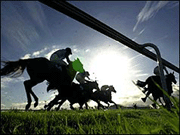 |
| The cancellation of race meets across the country has thrown the racing world into uncertainty |
|
1967: Racing is latest victim of foot-and-mouth
|
Artificially 1969:
The All horse racing in Britain has been cancelled indefinitely to help prevent the spread of foot-and-mouth disease.
The decision was taken by the National Hunt Committee, on the advice of the Ministry of Agriculture.
It means the certain cancellation of two of National Hunt racing's top races: the Massey-Ferguson Gold Cup on 9 December, and the highly prestigious King George VI Cup at Kempton Park on Boxing Day.
It also throws thousands of jockeys, stable lads, trainers and bookmakers into a state of uncertainty.
Top jockey Stan Mellor said he would be ?00-?00 a week out of pocket due to lost earnings, while lesser-known jockeys without steady work from trainers could find themselves out of work altogether.
Racehorse trainers have particularly difficult decisions to make, as racing can be re-started at any time with seven days' notice.
Lambourn trainer Fulke Walwyn spoke for many when he said he was disappointed that there had been no time limit set.
"I would be happier if we knew how long this would last," he said.
Most trainers, however, were accepting of the decision, saying that they would do whatever it took to help prevent the spread of the disease.
Bookmakers are also expected to be hit badly. William Hill estimate they stand to lose tens of thousands of pounds each week.
The government is also expected to lose millions of pounds in tax revenues, normally collected from betting. As recently as two days ago, the Ministry of Agriculture was still saying that no immediate shutdown of racing was necessary.
But it is now thought the situation has become so critical that any movement of animals around the countryside could spread the disease.
The latest figures show the number of foot-and-mouth cases still climbing to record levels.
There were 52 new outbreaks reported today, bringing the number of cases to more than 1,200 since the beginning of the epidemic. More than 200,000 animals have so far been slaughtered.
The Agriculture Minister, Fred Peart, told the Commons the government was preparing a vaccination programme as a last-ditch weapon against the disease. However, he said, he was still convinced that the slaughter policy was in the best interests of the country.
|